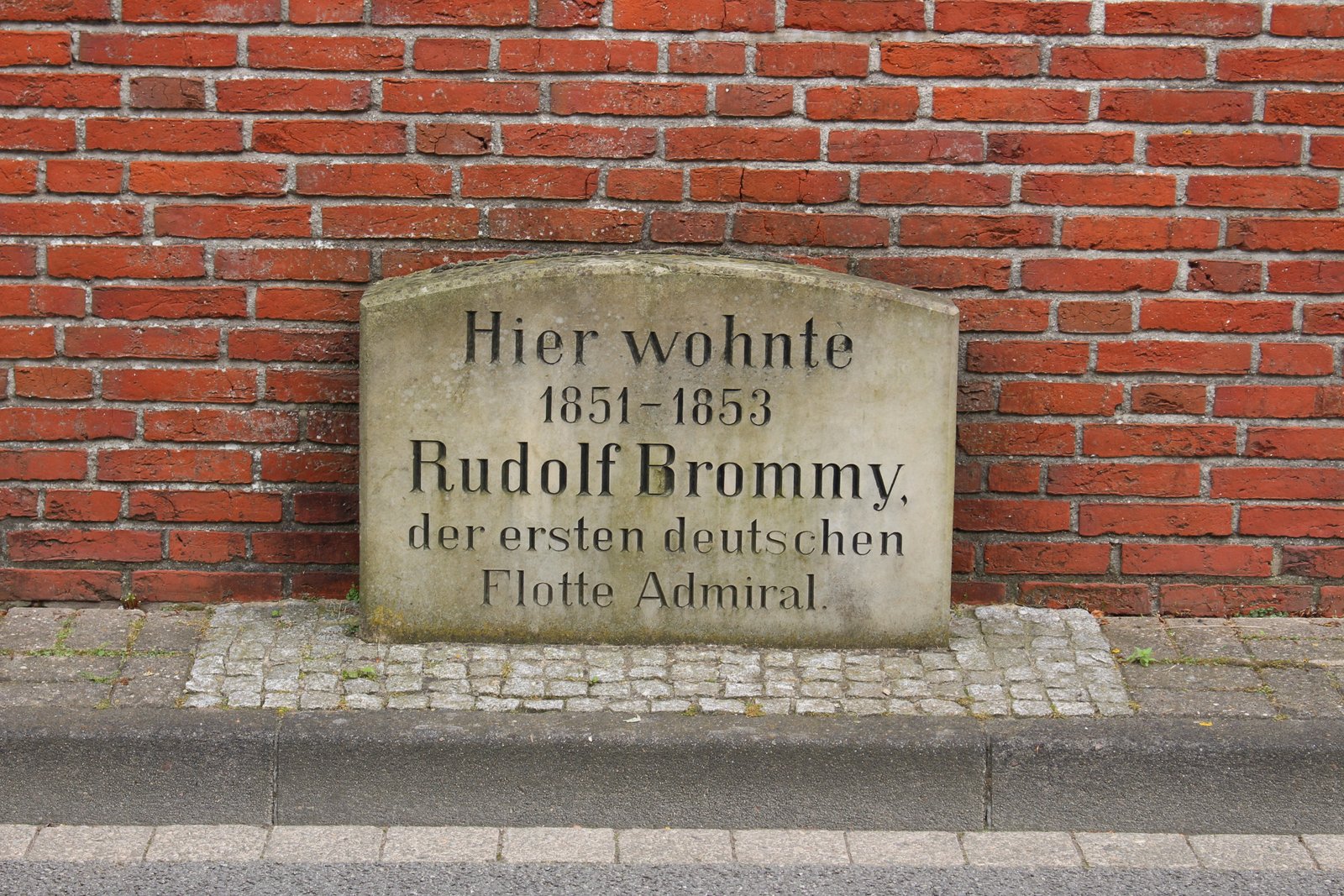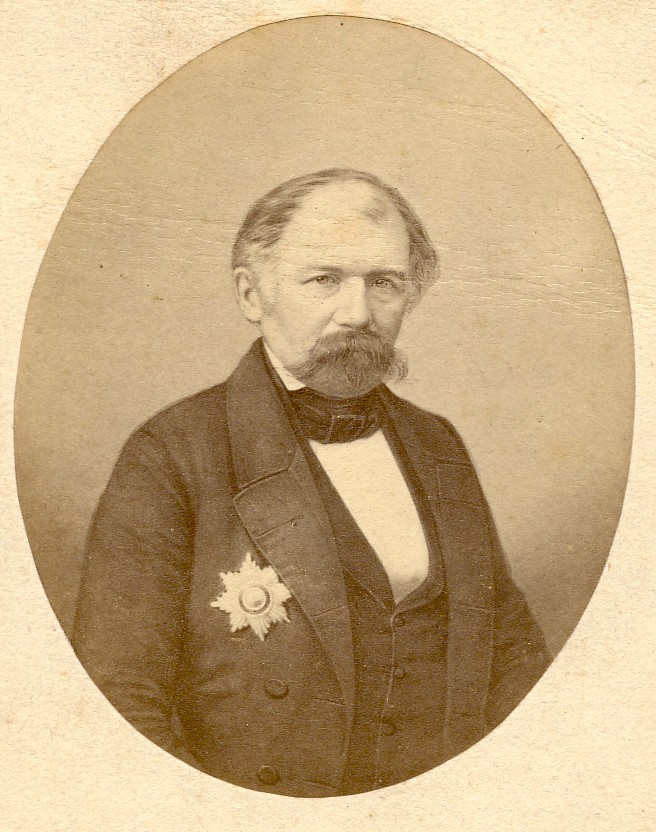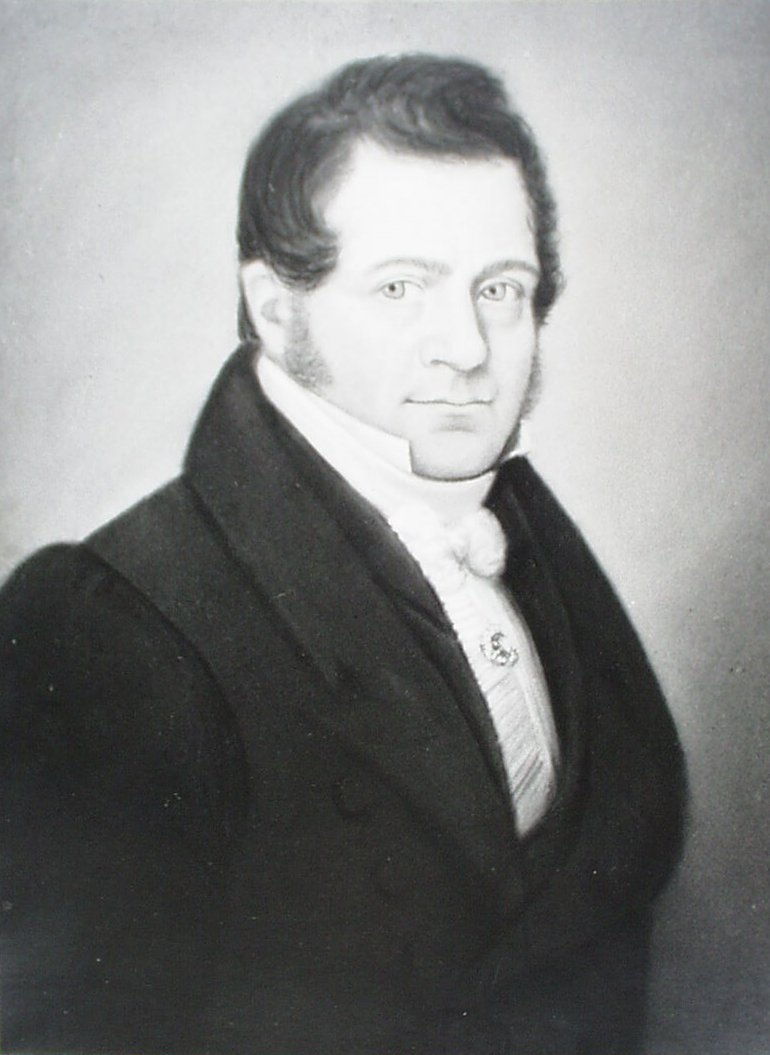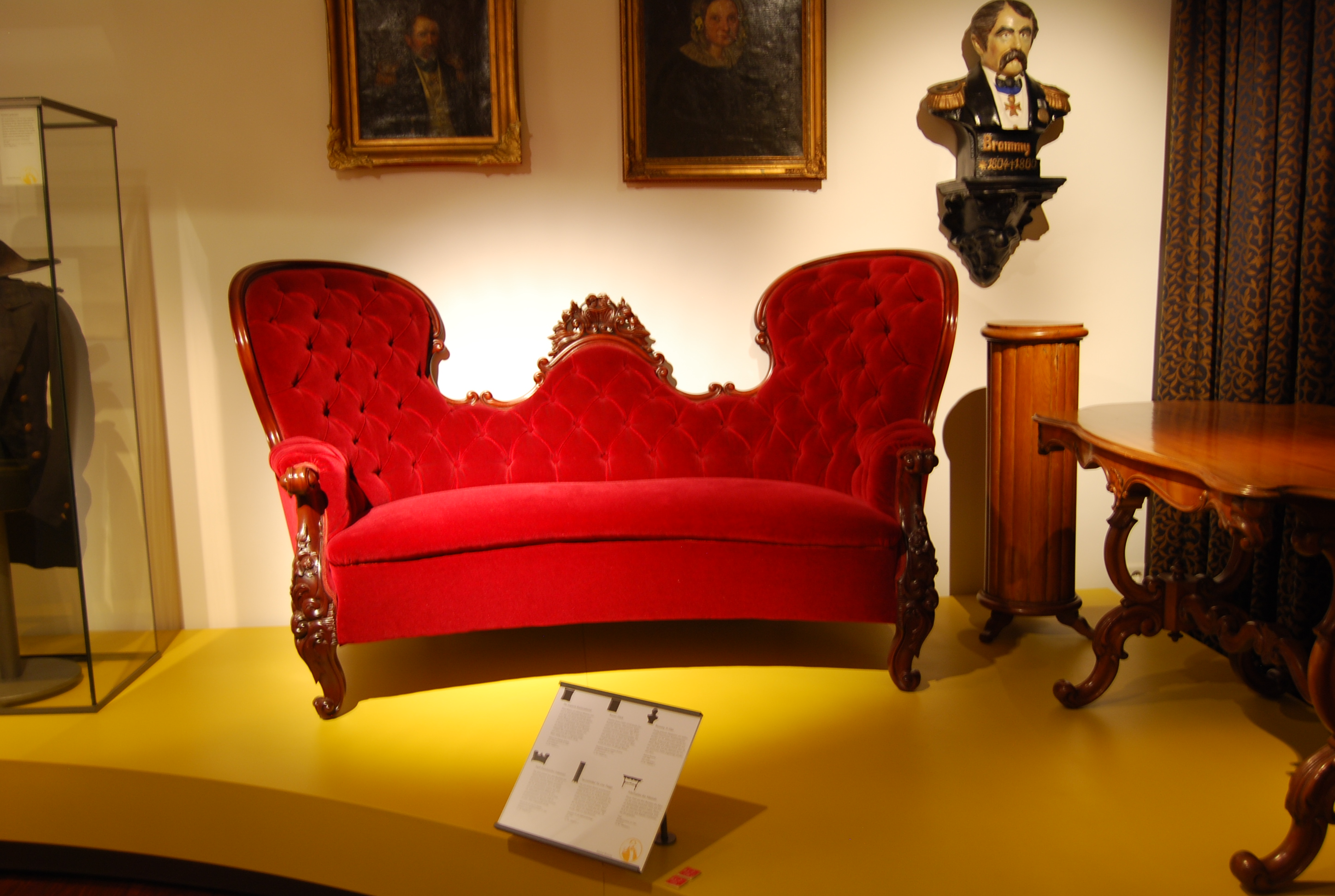
Bewerten
ee04cd17-19a1-436a-8b2b-3ea69b08ffda|0|.0|96d5b379-7e1d-4dac-a6ba-1e50db561b04
Nothing more than a simple stone reminds us of the former business and residential house of the entrepreneur, shipyard owner and restaurant owner Gerhard Gross. In this very location, he and his family housed Carl Rudolph Bromme, better known as “Brommy”. Brommy was, as of 1849, a rear admiral and the commander of the German military fleet. The fleet headquarters were located in Bremerhaven; the city of Brake served as an additional base and as a winter berth, although the fleet was disbanded in 1852. In the same year, Brommy married Caroline, the daughter of Gerhard Gross. Caroline´s brother Karl, who served under Brommy as a midshipman, founded a merchant shipping line in 1876 and a company which is now an international logistics enterprise domiciled in Bremen. As of 1881, Karl was a member and, as of 1896, the president of the State Parliament of Oldenburg.
Brommy and the first Pan-German Fleet
 Carl Rudolph Bromme
During the Danish blockade of the German coastline, the Naval Congress decided on the 6th of June 1848 to establish the first German Imperial Fleet. Carl Rudolf Bromme, actually born Leipzig in Saxony, was designated as the Commander-in-Chief of the Fleet. In 1804, at 18 years of age, he emigrated to North America and anglicized his name to “Brommy”. At the age of 23, he entered into the service of the Greek Navy, fought in the War of Independence against the Turks and ascended to the top. In particular, he gained respect for his expert and at the same time exoteric compendium broadly covering naval science. Furthermore, he was regarded as a liberal-minded aesthete who engaged in composing and writing. In spite of the limited financial means made available to him, he assembled, within a short period of time, a rather well-equipped naval formation consisting of 11 large vessels, 27 paddle gunboats and some 1,500 men.
Carl Rudolph Bromme
During the Danish blockade of the German coastline, the Naval Congress decided on the 6th of June 1848 to establish the first German Imperial Fleet. Carl Rudolf Bromme, actually born Leipzig in Saxony, was designated as the Commander-in-Chief of the Fleet. In 1804, at 18 years of age, he emigrated to North America and anglicized his name to “Brommy”. At the age of 23, he entered into the service of the Greek Navy, fought in the War of Independence against the Turks and ascended to the top. In particular, he gained respect for his expert and at the same time exoteric compendium broadly covering naval science. Furthermore, he was regarded as a liberal-minded aesthete who engaged in composing and writing. In spite of the limited financial means made available to him, he assembled, within a short period of time, a rather well-equipped naval formation consisting of 11 large vessels, 27 paddle gunboats and some 1,500 men.
Brake serves as a naval Station
The stationing of thee military fleet along the mouth of the Weser pushed even the people of Oldenburg into the spotlight. Councilor Albrecht Johannes Theodor Erdmann, as the Grand Ducal Commissioner of the German Federal Fleet, and Oldenburg´s Federal Envoy, Colonel Mosle, actively made the case for Brake. The competition in Bremen and Hannover could not overtake Brake. Brommy, who had already anchored the headquarters and the maritime quartermaster office in Bremerhaven, selected Brake as a provisional naval station.
On the 18th of March 1849, the “Barbarossa” sailed into Brake with Brommy aboard, and the reception was phenomenally enthusiastic. The young maidens of Brake presented Brommy with a custom-made pennant for his flagship. During the course of the next few weeks, the “Acadia” and the “Erzherzog Johann” also berthed in Brake. With the exception of a specially built dry dock, however, further construction plans were not able to be realized in Brake. Nevertheless, establishments such as a theater and an officers´ club were built in Brake.
A Short Intermezzo
 Gerhard Gross
The first Pan-German Fleet was involved in merely one battle with Danish warships, near Heligoland at the beginning of June in 1849. On the 2nd of April 1852, the German Parliament decided to dissolve the fleet. Admiral Brommy received the order to consolidate the vessels near Bremerhaven. The “Barbarossa” and the “Eckernförde” were handed over to Prussia. Ships, equipment and marine installations were sold. The fleet personnel was dismissed, the officers were discharged. Thereby, the officers received only minimal compensation and small pensions. Even Brommy had to fight for an adequate compensation for himself for a long time.
Gerhard Gross
The first Pan-German Fleet was involved in merely one battle with Danish warships, near Heligoland at the beginning of June in 1849. On the 2nd of April 1852, the German Parliament decided to dissolve the fleet. Admiral Brommy received the order to consolidate the vessels near Bremerhaven. The “Barbarossa” and the “Eckernförde” were handed over to Prussia. Ships, equipment and marine installations were sold. The fleet personnel was dismissed, the officers were discharged. Thereby, the officers received only minimal compensation and small pensions. Even Brommy had to fight for an adequate compensation for himself for a long time.
The Return to a private Life
On the 6th of May 1852, Brommy became engaged to Caroline Gross. They married on the 1st of July in the Church of Hammelwarden. Shortly thereafter, they moved to Bremerhaven. Their son Rudolf (Carl Rudolph Traugott Gerhard) was born on the 9th of May 1853, he died at the age of 17 near Metz as a result of typhus. Brommy himself was also in poor health and unable to take on further positions of responsibility. He passed away on the 9th of January 1860 in St. Magnus near Vegesack. With his casket covered by the Imperial Flag, he was laid to rest in Kirchhammelwarden. His widow Caroline survived him by several decades.
In 1897, a memorial was dedicated to him in the Kirchhammelwarden Cemetery, and it contains the words of the marshland poet Hermann Allmers.
Im Museum erleben
The Maritime Museum of the Oldenburgian Lower Weser is one of the leading institutions in the research of life and work of Carl Rudolph Bromme. At Borgstede & Becker House you can see several pieces of furniture and paintings from the family’s private collection. If you are curious about Brommy’s lyrical and musical work, you can read up and listen at a media station.
You can find more information on Admiral Brommy at the "Hammelwarden Cemetery".
Maritime Museum - "Haus Borgstede & Becker", Breite Straße 9, 26919 Brake - 1st floor
"Hammelwarden Cemetery", Hammelwarder Str. 3, 26919 Brake

Additional information and offers
Culture Call: For this station, there is a CultureCall available, provided by BrakeVereins.
Click the logo to reach the entry, or call one of the following numbers and select Station 24.
German: +49 4401 / 102-102
Low German: +49 4401 / 102-103
